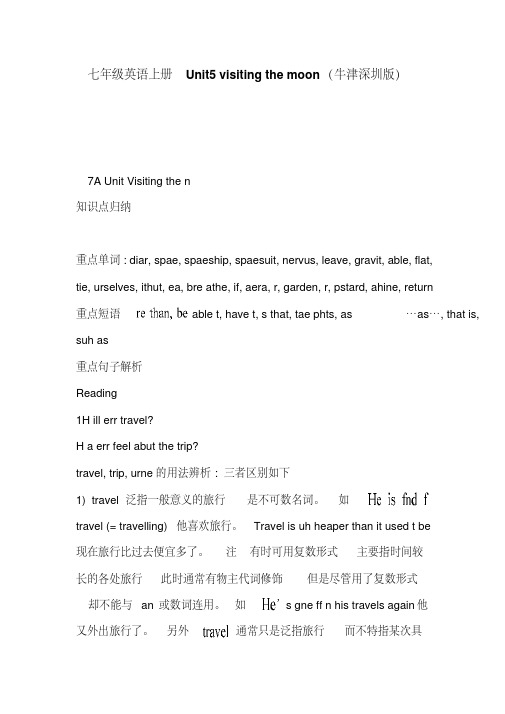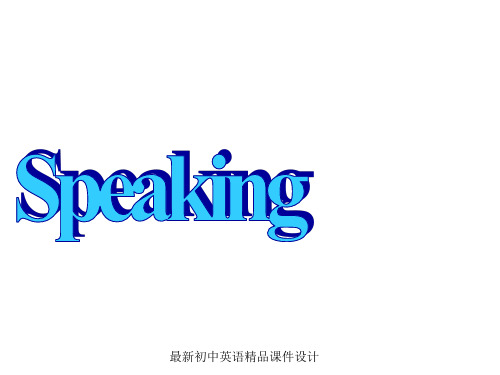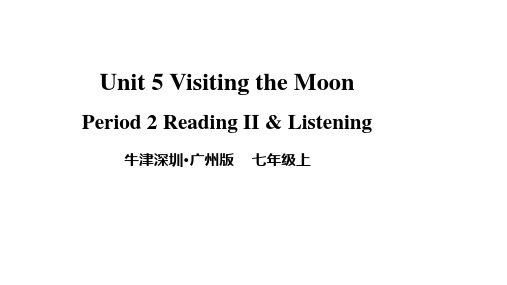牛津深圳版英语七年级上第五单元(Unit-05)
- 格式:ppt
- 大小:5.19 MB
- 文档页数:60

七年级英语上册Unit5 visiting the moon(牛津深圳版)7A Unit Visiting the n知识点归纳重点单词: diar, spae, spaeship, spaesuit, nervus, leave, gravit, able, flat,tie, urselves, ithut, ea, bre athe, if, aera, r, garden, r, pstard, ahine, return重点短语able t, have t, s that, tae phts, as…as…, that is, suh as重点句子解析Reading1H ill err travel?H a err feel abut the trip?travel, trip, urne的用法辨析: 三者区别如下1) travel 泛指一般意义的旅行是不可数名词。
如travel (= travelling) 他喜欢旅行。
Travel is uh heaper than it used t be现在旅行比过去便宜多了。
注有时可用复数形式主要指时间较长的各处旅行此时通常有物主代词修饰但是尽管用了复数形式却不能与an 或数词连用。
如’s gne ff n his travels again 他又外出旅行了。
另外通常只是泛指旅行而不特指某次具体的旅行所以通常不说2) urne 通常指远距离的陆地旅行并且不一定要返回到出发地(即通常指单程)。
如t urne 祝你一路顺风。
He ade a urne t Beiing 他去北京旅行了。
注有时并不指真正意义的“旅行而只是表示走过一段距离。
如你上班要走多远?3) trip 通常指近距离的为了办事或消遣而进行旅行并且往往要回到出发点(即指双程不过有时trip 也可指远距离的长途旅行可与urne 换用比urne 更通俗。
如约翰在哪里?’s n a trip t Shanghai 他去上海旅行了。





Unit 5 Visiting The Moon Words and expressions:A Trip to SpaceBy Jerry10 October 2060I am so happy! Tomorrow I will be one of the first students to travel into space. The spaceship will leave the Earth at 9 a.m. It will take us to the Moon. I can’t wait.The moon is around 380,000 km from the Earth, so it will take us about four days to get there. There is no gravity in space, so we will all be able to float around in the spaceship. We will have to tie ourselves to our beds so that we won’t float away in our sleep! Without gravity, our bodies may get weak, so we will have to do exercises every day.When we arrive, I am going to walk on the Moon. I will have to wear a spacesuit to help me breathe because there is no air on the Moon. I am going to take as many as I can, that is, if my camera still works there…一. 英汉互译。
Unit 5 Visiting The Moon 一、四会单词(看英文写中文)1. diary2. space/room3. spaceship/spacesuit4. nervous5. leave/leaves/leaf6. able/enable7. tie8. without/with9. weak 10. breathe/breath11. camera12. work/works13. garden14. rock/stone15. postcard16. machine17. return二、四会词组1. more than = over2. be able to = can3. have to / must4. so that = in order that/in order to5. take photos6. as…as7. that is (to say)8. such as/for example9. feel about10. in one‟s sleep11. be nervous about12. take sb. to sp.13. a large amount of14. in the future15. at the moment16. a trip to…17. tie…to…18. float away三、必背句子1. I‟ll be one of the first students to travel into space.2. The spaceship will leave the Earth at 9 a.m. It will take us to the moon.3. The moon is around 380,000 kilometers from the Earth, so it will take us about four days toget there.4. So we‟ll all be able to float around in the spaceship.5. We will have to tie purselves to our beds so that we will not float away in our sleep.6. Without gravity, our bodies may get weak, we will have to do exercise every day.7. When we arrive, I am going to walk on the Moon.8. I will have to wear a spacesuit to help me breathe because there is no air on the Moon.9. I am going to take as many as I can, that is, if my camera still works up there.四、单元语法一般将来时1. 结构:be going to + 动词原形/ will + 动词原形;2. there be 句型中需要注意的事项;知识点at night, in the evening, in the morning, in the afternoon, 但如果表上午,下午,晚上的词前有修饰语,即表“怎样的一个晚上/早上/下午”前面的介词都要用oneg: on Monday morning, on a rainy evening①so: adv 如此,用于形容词或副词前加强语气eg: You are so kind.②so: conj 因此,用于连接两个句子,表结果,so表因此时,不能和because连用eg: I got up late, so I was late for school.eg:Simon is one of the members of the Basketball Club.② the first students: 第一批学生,第一组学生(此时first后的名词是复数)the first student : 第一个学生(此时first后的名词是单数)③ the first students to travel into space: 序数词后的动词常用不定式eg:He is always the first student (come) to school.wait to do sth 等着做某事;wait for sb/ sth 等着某人或某物eg; I can‟t wait to see you again.Please wait for me.对此部分提问因用How far: How far is the Moon from the Earth?② It takes +sb + time + to do sth. 做某事花了某人多长时间eg:It take Jim an hour to go to work every day.③ get there: 到达那儿get to sp 到达某地eg: get to London; 但当后面接的地点是here, there,home时,介词to 要省略eg;When do you usually get home?① no: adj 没有,不是,放于名词前,相当于not any, 前半句可改写为:There isn‟t any gravity in space.改写下列同义句:Susan has no homework today.Susan homework today.②be able to do: 能够做某事=can/ could★I am able to answer the question. = I can answer the question.I was able to answer the question.= I could answer the question.③ around: adv 在四周,四处,到处= here and thereeg: This is Kehan. Mrs Xiong will show you around.① have to: 必须,不得不, 与must意思相近,但也有一定区别have to: 表客观的需要,must: 表说话人主管的看法比较:My younger brother is ill, so I have to take care of him.I think we must work hard.拓展:don‟t have to do 不必要做…..;mustn‟t do 禁止做②so that:以便,为的是,可用来连接两个句子,引导目的状语从句eg: I work hard so that I am able to learn English well.①as +adj/ adv+as sb can 尽某人所能eg: The rabbit runs as fast as it can.You should practice English as often as you can.拓展:as…..as possible尽可能的eg: as soon as possible 尽可能的快as careful as possible 尽可能的仔细as hard as possible 尽可能的努力② that is: 那就是说;也就是说,即,一般前后用逗号隔开eg: I think you are kind, that is, I want to make friends with you.such as: 例如,诸如此类的用于举例,such as 和后面的例子不用逗号隔开,可列举多个例子。
七年级英语上册Unit5 visiting the moon(牛津深圳版)A Unit5 Visiting知识点归纳重点单词: diary, space, spaacesuit, nervous, leave, gravity, able, floaurselves, without, weak, bre aamera, work, gardard, mau重点短语?more than, be able to, havat, taas…as…, that is, such a重点句子解析?Reading1.How willavel?How mal abou?avelurney的用法辨析: 三者区别如下?1). travel 泛指一般意义的旅行?是不可数名词。
如? Hd of travel (= travelling). 他喜欢旅行。
Travel is much cheaper than it used to be. 现在旅行比过去便宜多了。
注?有时可用复数形式?主要指时间较长的各处旅行?此时通常有物主代词修饰?但是尽管用了复数形式?却不能与 many 或数词连用。
如? He’s gavels again. 他又外出旅行了。
另外?travel 通常只是泛指旅行?而不特指某次具体的旅行?所以通常不说?How was your travel?2). journey 通常指远距离的陆地旅行?并且不一定要返回到出发地(即通常指单程)。
如? I wish you a pleasant journey. 祝你一路顺风。
He made a jouBeijing. 他去北京旅行了。
注?journey 有时并不指真正意义的“旅行”?而只是表示走过一段距离。
如?How long is your jouwork? 你上班要走多远?3). trip 通常指近距离的为了办事或消遣而进行旅行 ?并且往往要回到出发点(即指双程)?不过有时 trip 也可指远距离的长途旅行?可与 journey 换用?比journey 更通俗。